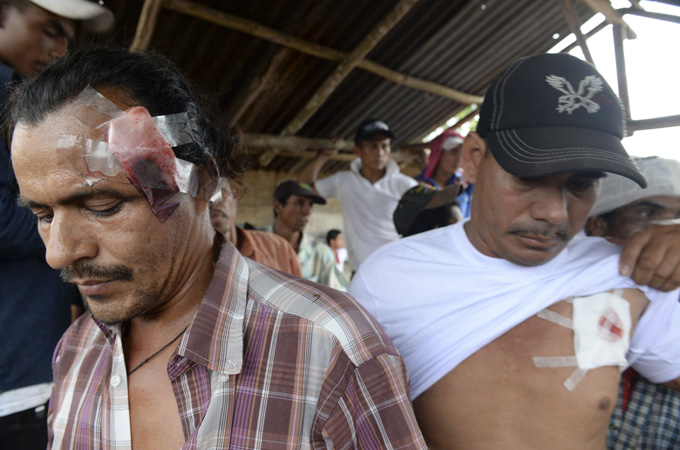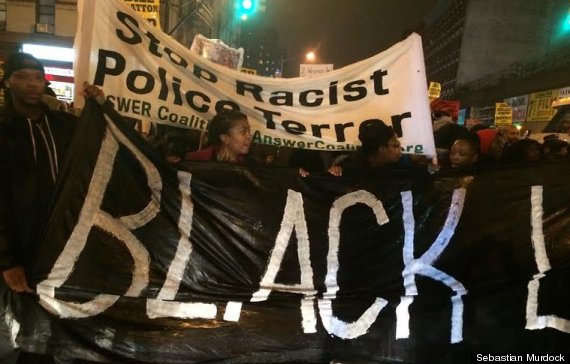By Kathryn Maureen Ryan
Impunity Watch, Managing Editor
CAIRO, Egypt – Monday marks the one year anniversary of the arrest of Baher Mohamed, Mohamed Fahmy and Peter Greste who were jailed in Cairo on December 29, 2013 on charges of aiding the Muslim Brotherhood and spreading “false news.” In June, Greste, an Australian, and Fahmy, an Egyptian-Canadian, received a seven-year sentence, while Mohamed, an Egyptian, was sentenced to 10 years. The arrests and charges sparked international condemnation from world leaders and journalism and speech advocates around the globe. Al Jazeera has denied all charges against its staff and has called on the immediate release of the journalists. Journalists and activists around the world have posted photos of themselves holding up banners bearing the Twitter hashtags “#FreeAJStaff” and “#JournalismIsNotACrime.”

Baher Mohamed’s wife, Jehan Rashed, told Al Jazeera that the day her husband was arrested had been the worst of her life. “The sentiment of injustice is overwhelming,” she said. “Baher was arrested on this day a year ago. It was the worst day Baher, our children and I have ever lived.” She continued “It was a dark day. I wonder if the [Egyptian] Army and Police are protecting the people. They came to arrest a journalist, while realizing deep within he is a respectable professional, but they acted as if he was a felon.” Colleagues and friends of the jailed journalists marked the anniversary of their arrest at newsrooms across the world on Monday.

Later this week an Egyptian court will decide whether the journalists have grounds for an appeal of their convictions. The court will start to look at the case on Thursday and will examine the process behind the original trial, a process that Al Jazeera has maintains was flawed. The journalists deny collaborating with the banned Muslim Brotherhood after the overthrow of democratically elected President Mohammed Morsi in a military coup last year. They say they were jailed simply for reporting the news.
The court can either dismiss the entire case, uphold the verdict and the original sentences, or order a new trial. The Egyptian government has defended the jailing of the journalists, arguing that it was not a political decision. While President Abdel Fattah el-Sisi is able to issue a presidential pardon he maintains that he will not interfere in the judicial process.
World leaders have called for the release of the three journalism, viewing their arrest and convictions as an affront to free speech in the new Egypt, which the government maintains is a democratic state. United States President Barack Obama called for the release of the journalists earlier this year, urging the newly elected Egyptian president to free the jailed Al Jazeera journalists.
Peter Greste penned a letter just before Christmas from his cell in Cairo. The letter was first published in The Sydney Morning Herald. The Letter reads:
[one_half]I write to all our friends and supporters from my jail cell in Mazraa Prison, Cairo.
As we approach Christmas and the rather inauspicious anniversary of our arrest on December 29, there is a temptation to become morose over our continued detention. After all, on paper we don’t seem to have made much progress.
The three of us – myself and my colleagues Mohamed Fahmy and Baher Mohamed – are still in prison, still convicted of broadcasting false news and aiding a “terrorist organization,” and still just one year into prison sentences of seven years for myself and Fahmy, and 10 years for Baher.
But, at the same time, we have changed something fundamental. We – and by that I mean all involved in this fight for justice, including us three, our families, and you, our supporters – have created a huge global awareness of not just our cause, but the far wider and more vital issues of press freedom, the persecution of journalists, and of justice in Egypt.
We have galvanized an incredible coalition of political, diplomatic and media figures, as well as a vast army of social media supporters to fight for that most basic of rights: the right to know. Everyone, from US President Barack Obama to the United Nations Secretary-General Ban Ki-moon to Prime Minister Tony Abbott, has been speaking out both publicly and in private to demand our release and call for a free press in Egypt.
But, even more than that, we have reignited public discussion and awareness of the vital role that unfettered journalism plays in any healthy, functioning democracy.
Sometimes it is easy to forget why we need it at all. Journalism can, at times, look pretty sordid, and few of us who work in it can claim to have never succumbed to the more base instincts of our trade. And in the wired world of the internet, with its citizen reporters and millions of sources, it is tempting to wonder why we need professional journalists at all.
But that noise is the reason itself. Never has cleared-eyed, critical, skeptical journalism been more necessary to help make sense of a world overloaded with information.
We should never forget that journalism is not a science. It is a human craft as vulnerable to biases and inaccuracies and flaws as any other. And, at its worst, it can be quite destructive. But the reason we still buy newspapers, listen to the radio or switch on the evenings TV news bulletin is to find context and understanding; a sense of perspective.
The best journalism puts a frame around an issue. It helps define it, clarifies it, and makes sense of it. And, above all, it challenges authority.
In a functioning democracy, political legitimacy comes from the voters. We, the people, hire politicians. As with any responsible business, it is incumbent on employers to keep an eye on their employees and, as we all know, we tend to work better, more efficiently and more honestly when we know we are being monitored.
I am not talking of a big brother society here. Just good, old-fashioned accountability.
The philosopher and writer Albert Camus was absolutely right when he said the press can, of course, be both good and bad, but without freedom it can never be anything but bad.
That is why our cause, as opposed to simply our case, is so important, and not just for Egypt. The noise you all have been making sends a clear and unequivocal message to politicians around the world: a free press is an indivisible part of a free society.
As we approach the end of our first year in prison, I cannot help but feel proud and strengthened by all that has been achieved so far. We haven’t won this fight yet – we are still behind bars after all – but we have made our cause abundantly and unequivocally clear.
And for that reason, it really is a very good Christmas.
So, from our cell in Cairo, all the very best in season’s greetings.
[/one_half]For more information please see:
Al Jazeera – Al Jazeera Staff Held for One Year in Egypt – 29 December 2014
BBC News – Egypt Urged To Free Al-Jazeera Staff on Arrest Anniversary – 29 December 2014
Al Jazeera America – Jailed Al Jazeera Journalist Pens Letter before Christmas – 23 December 2014
Al Jazeera – Obama Presses Sisi on Jailed Al Jazeera Staff – 26 September 2014


